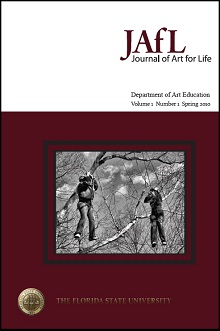A Balancing Act: Intelligence, Equity, and the Arts in Education
Keywords:
arts education, arts in learning, capacity, successful intelligence, equity, social justice, creativity, critical thinking, brain research, neuroscience, equal access, critical pedagogy, whole-brainedAbstract
This article expands on social justice in education through the lens of equal access to the arts. Claims for an equitable and quality education stand in tension with whether such ideals can exist without access to a balanced education, including the arts. It sheds light on educational practices and policy decisions that, if transformed, hold power for cutting through pluralistic lines toward success for all students. The arts are essential partners in a quality and socially just education, for morally practical reasons involving learning capacity, equal access, and overall well-being. Although recognized as essential to a quality 21st century education, the arts remain on the margins of educational and academic policy, leading to the need for balanced thinking and learning approaches. In actuality, to not consider the implications of educational decisions affecting the rights of the future leaders of our society for a quality education, including the arts, is a social injustice (Bumgarner, 2007; Gadsden, 2009). Narrow definitions of intelligence as well as inequitable subsets of valued skills serve as witness to how power plays a role in establishing curricular content in schools. Evidence is given for the cognitive, social, and dispositional capacity-building role of the arts in learning.Downloads
Published
2010-03-15
Issue
Section
Articles
License
Authors who publish with this journal agree to the following terms:- Authors retain copyright and grant the journal right of first publication with the work simultaneously licensed under a Creative Commons Attribution License that allows others to share the work with an acknowledgement of the work's authorship and initial publication in this journal.
- Authors are able to enter into separate, additional contractual arrangements for the non-exclusive distribution of the journal's published version of the work (e.g., post it to an institutional repository or publish it in a book), with an acknowledgement of its initial publication in this journal.
- Authors are permitted and encouraged to post their work online (e.g., in institutional repositories or on their website) prior to and during the submission process, as it can lead to productive exchanges, as well as earlier and greater citation of published work (See The Effect of Open Access).


